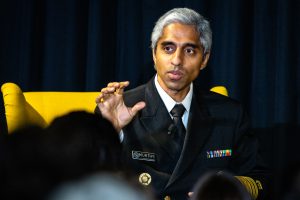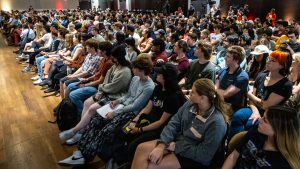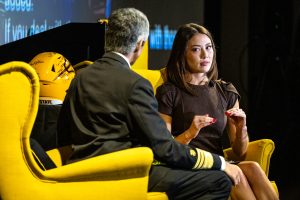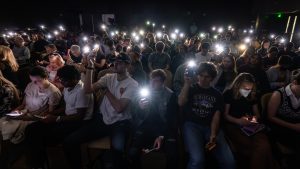- Slug: BC-CNS-General Loneliness. 530 words. By Deanna Pistono.
- 4 photos available (thumbnails and captions below).
- Video story available.
By Deanna Pistono
Cronkite News
TEMPE – U.S. Surgeon General Vivek Murthy addressed Arizona State University students on Nov. 13 at Memorial Union on the Tempe campus as part of his “We Are Made to Connect” tour. In conversation with Emma Broyles, ASU student and Miss America 2022, Murthy advised the audience to connect meaningfully with those around them to benefit their mental and physical health.
“If you are like me, who was struggling with loneliness as a kid, you probably just thought, ‘Loneliness is just a bad feeling, gotta to suck it up, get it over with, it’s fine,’” Murthy said.
“It turns out that loneliness has real consequences for our health. When people struggle with the sense of being lonely and isolated, basically being socially disconnected, that actually increases their risk of depression, anxiety and suicide,” he said. “It also … over time, increases their risk of physical illness as well. Heart disease, dementia, premature death. In fact, we see that the overall mortality impact of social disconnection is on par with smoking daily.”
This tour is the most recent part of Murthy’s commitment to promoting social connection. In May, Murthy put out a public health advisory warning that an epidemic of loneliness and isolation is a “public health crisis that has harmed individual and societal health.” To combat loneliness, the advisory lays out a six-pillar strategy of steps that individuals, communities, governments and the health care system can take to foster meaningful social connection.
“This whole effort to build a more connected life, this is not about transforming all of us into something unnatural or different. This is about returning to who we are,” Murthy told the ASU audience. “We evolved to be connected to one another. The people who built trusting relationships, those are people who survived, who shared their food, who protected each other around the fire at night from predators.”
According to Murthy, improving social connections may not only heal individuals, but society as well.
“If the social fabric in our communities starts to fray as it has in recent years, that puts all of our lives at risk,” Murthy said.
“It’s about health, but it’s much bigger than health, and that’s what has to be a priority for us to address,” he said.
At the end of his talk with Broyles, who discussed her own mental health journey, Murthy led the audience in the first part of his 5-for-5 Connection Challenge – a challenge to do something each day “to express gratitude, offer support, or ask for help.”
“I want you to think about someone that you’re grateful for in your life,” Murthy said.
“Now I want you to take the next 30 seconds or so … and I want you to write a text or an e-mail to that person,” he said. “And it could be a single line. But just tell them that you’re thinking about them and why you’re grateful to them. And when you’re done, I want you to turn the flashlight on on your phone and just hold it up.”
In a matter of seconds, the glow of cell phones lit up the room as grateful words made their way to friends and loved ones.
For more stories from Cronkite News, visit cronkitenews.azpbs.org.



